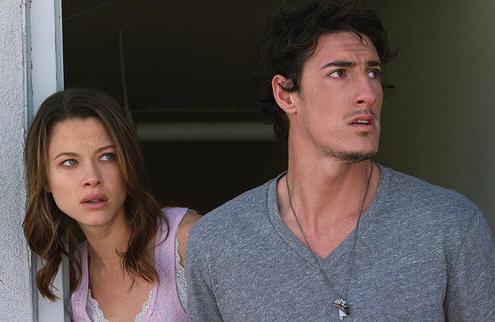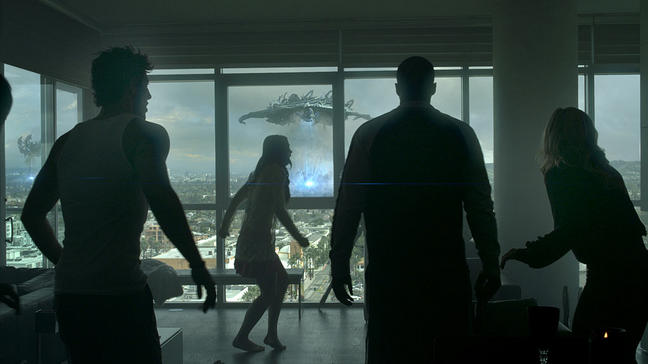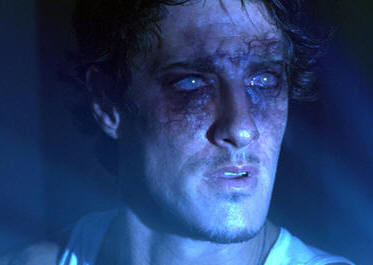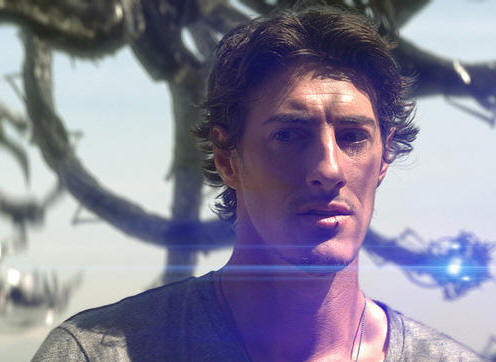Eric Balfour
is one of those actors that you see all over the place. He started
out as a child actor in the early 90s as a
short-lived regular on the series Kids Incorporated.
Since then he has played a varied and interesting series of roles
in TV and film.
Balfour was
Claire’s misunderstood delinquent boyfriend in Six Feet Under.
He was the smart and competent counter-terrorism
independent contractor in 24. He
was one of the first victims in the series of Buffy the Vampire
Slayer. He was an unfortunate traveler who got
caught up in The Texas Chainsaw
Massacre.
Balfour is currently co-starring as the
enigmatic local eccentric with some hazy
childhood connection to a
decades old mystery in the current hit SyFy Channel series Haven,
which is loosely based on Stephen King’s
novella The Colorado Kid. He has also just
done an arc on the popular ABC series
No Ordinary Family as a killer cursed with wolf-like
superpowers.
You may even
know him as the lead singer of the indie rock group Born as Ghosts.
However, one
place he really hasn’t been seen before was as the lead actor in a
hit studio production. That changed last year, when his
alien-invasion film Skyline was released to
surprising popular success in theaters.
In Skyline,
Balfour played Jarrod, a New York native who is visiting Los Angeles
with his fiancée (Scottie Thompson of Trauma). While staying
in the luxurious townhouse of his oldest friend (Donald Faison,
formerly of Scrubs), they become witnesses and survivors of
an invasion of spacecrafts that lays siege
on Los Angeles. Despite the film’s low budget (or perhaps because
of it), the film was considered a big box office success and is
being considered for one or more sequels.
A few days
before Skyline was to be released on video, Balfour gave us a
call to discuss his movie and his career.
 Skyline
was your first lead role in a major film. How did it come about
and what was it like to experience?
Skyline
was your first lead role in a major film. How did it come about
and what was it like to experience?
You are correct; it was definitely
my first lead role in what turned out to be a large studio movie.
In some ways, to be fair, it didn’t really start out that way. We
made the movie for a million dollars.
(chuckles) So, it was
a gamble, like a lot of independent films. You go in hoping for the
best and doing your best work. I honestly didn’t know that I’d be
shouldering something as big as I was. And I was very excited when
it turned out to be that. We’re really happy with the outcome.
Obviously, the final budget of the movie ended up being like ten
million – all in with the effects. We’ve made almost ten times that
internationally on the film. I guess there is an economics and a
commerce to what we do, as much as I’d like the ability to be an
artist. As a career, I also understand there is a commerce involved
in it. To be able to prove and show that I can carry a movie that
far was really important. I don’t have a ceiling or a limit to how
far I want to go. I’ve never been satisfied with any one particular
place that I’ve been. I’ve always wanted to learn more and strived
to do more. I hope this opens up the door to more opportunities
like that. As we got closer to the release, I definitely felt some
of the pressure of it, but was excited. I was excited to get out
there and speak on behalf of the movie. I think in hindsight we
learn things. Although it was a great blessing for us to have this
giant machine of Universal and Relativity behind us to promote the
movie – and they did a fantastic job – I think in some ways we lost
sight of the fact of how small the movie really was. It may have
confused audiences. This really was a little, independent film and
– especially right now, we’re getting compared to Battle: LA.
Well, Battle: LA was a 100-million-dollar movie.
I guess I wish in some ways we had focused more on the independent
spirit of the movie and the accomplishments that we were able to
create such a visually grand-scale movie with such a small budget,
but, you know, you live and you learn. I’m still really proud of
what we did, though.
I agree, the special effects
were terrific for that small a budget. As an actor, how weird was
it to be acting with and reacting to things that weren’t there –
like the aliens, the lights and the ships?
Honestly, it’s never been
something that’s affected me that much. A
lot of what we do is about believing where you are. Whether you are
talking to a person in front of you or an inanimate object, you have
to believe what you are saying. If you’re talking to another human
being and having to convey that you actually love them, when they
are someone you just met weeks earlier, it’s not that different. So
that part never really bothered me. There are always logistical
issues – trying to figure out: Okay, if I’m looking at the sky at
this alien ship, is it 50 feet away, or is it 100 feet away? Or is
it a mile away? (chuckles) Those things were harder than
anything else. But I don’t mind it.
Do you believe in aliens? And
if so, do you think if they do come down they will want to be
friends or eat our brains like in Skyline?
You know, I have a couple of
really strong thoughts about the subject. I think it would be
really egotistical of us to believe that we are the only similar or
intelligent life anywhere in the universe. In
that regard, you have to believe statistically there must be
something else out there. Now, Stephen Hawking makes an interesting
point. The
elements that created humanity and created the Earth are really
pretty spectacular. For all of these things to line up
[is so unlikely], you know? So, for another civilization
similar – or of similar intelligence – to exist at the exact same
time that we do may not be possible. The fact is, there may be a
life form that was similar or an alien life form that existed a
million years ago somewhere else, but by the time they could reach
us, it would take a million years to where we are today.
The idea that there are two existing at
the exact same time in different places in space may
be the logistical issue and may be
really where we should be focusing our energy. Not so much trying
to explore space as it were physically right now, but more from a
time standpoint.
 One interesting thing about the
movie is because it is a smaller indie, while LA is being destroyed;
you’re basically seeing it only from the point of view of one
building and maybe ten people affected. I hate to say it, but it
seems like your character Jarrod was the last person in the world to
notice that his girlfriend Elaine was pregnant. However, when he
did find out, even though he wasn’t sure he was ready for a baby, do
you feel it made him even more protective of her?
One interesting thing about the
movie is because it is a smaller indie, while LA is being destroyed;
you’re basically seeing it only from the point of view of one
building and maybe ten people affected. I hate to say it, but it
seems like your character Jarrod was the last person in the world to
notice that his girlfriend Elaine was pregnant. However, when he
did find out, even though he wasn’t sure he was ready for a baby, do
you feel it made him even more protective of her?
Obviously, as an actor, that was
the intention of what you are trying to do with it. You’re watching
this character start as – for the lack of a better word – as a boy.
Through the course of this calamity, he is forced to become a man.
That was the goal. That was what I had to hold onto as an actor.
And that was the thing, too. I think
a lot of people were frustrated, because obviously the movie doesn’t
exactly have a happy ending. It doesn’t have a classic popcorn
ending, for sure. There is no scientist that shows up in the third
act and explains what the aliens are doing or why. That was the
goal of the movie. Everyone was like, “where’s the explanation?”
Well, in reality, if you were stuck in an earthquake or a flood or a
tornado, you wouldn’t always have an explanation. If you were in a
building and that building collapsed, you may not necessarily know
exactly what caused it for quite some time. That was what we wanted
to convey with the movie: the isolation of being stuck in this one
place and not having contact with the outside world. One of the
biggest distinguishing differences between us and Battle: LA
is that Battle: LA is this large-scale war. Ours was really
about the people who were stuck in the buildings, not knowing what
was going on and how it was going on.
If you were in Jarrod’s
position, would you have stayed in the building or tried to run for
it?
I definitely would have tried to
make a run for it.
I was reading that the Brothers
Strause are planning on making
Skyline
the first of at least two, maybe even a series of films. Obviously,
without giving the ending away, your character was left in sort of a
precarious position, is there any way that your character or maybe
Scottie’s will be in the future movies – even in flashbacks or
something like that?
I think the idea has been
discussed in using almost a RoboCop model. If you took
Jarrod the alien, who is fighting the aliens – like in RoboCop
you would see the flashbacks of when he was a human being.
There’s been talk of something like that.
You are probably best known for
television, though you have done quite a few films as well. How is
television and film work different?
Honestly, nowadays it’s not that
different. (laughs) The fact is, big television shows have
very stretched-out, long shooting schedules and have lots of time,
and conversely smaller films have to shoot very, very quickly and
move very efficiently. The line between film and television is very
blurred. In my opinion, and I’m really quoting Jon Cassar, who was
a producer and director of 24, he was referring to now as the
golden age of television. The fact is you’re seeing more
interesting work being done in television than you are in a lot of
films. You think about shows like Big Love,
Californication, Shameless and Boardwalk Empire –
these are really complex stories that are long arcs and really
fascinating. I’m a huge fan of television. It’s a really fantastic
place to work. I’m excited to go back in about a week and start
shooting season two of Haven.
 Without giving up any real
spoilers, what can we expect from the second season of Haven?
Without giving up any real
spoilers, what can we expect from the second season of Haven?
The second season is going to be
absolutely 100 times bigger, faster and darker than the first season
of Haven. Towards the end of the
first season, the writers really found their footing and really
found their voice. This season, in some ways it’s weird, it
feels like the shackles have been taken off and we’re allowed to run
now. I’m really excited about where my character is going.
I’m excited to get back and play him. I really like playing
Duke. I have a really great time playing that character.
I’m excited to get back up into the Maritimes and get to be Duke
again.
Duke is such an interesting
character, he’s very charming and yet he’s rather mysterious and
possibly dangerous. Do his contradictions make him more fun to
play?
Absolutely. There was a great
line that someone said to me: “Uncompromising men are easier to
like.” I love that Duke has lots of compromises. He’s fallible.
He’s not simply good or bad. Some of my favorite characters are
reluctant heroes. I was never a fan of Superman. I always liked
Batman. You know what I mean? You think about, like, Ari Gold on
Entourage, who I would never compare myself or my character
to, Jeremy Piven and that character are in a whole separate league,
the most amazing thing ever. But I love that character,
because one minute you hate him and he’s such a dick, and the next
minute he shows you that glimpse of humanity that it’s hard not to
fall in love with him a little.
Were you familiar with the book
The
Colorado Kid before taking the role?
I wasn’t familiar with it before
the show and I read it before we started shooting. I had to go what
the hell does this have to do with our TV show? But it was really a
jumping off point. There was something about it that inspired the
writers and the mystery of the Colorado Kid murder that inspired
them. Then this whole world evolved out of it. So I’m very
grateful to Sam Ernst and Jim Dunn in that regard, because they
created this amazing character from it.
You also are playing a villain
in a couple of episodes of
No Ordinary
Family
this month. What is your character like on that?
The character was this
criminal who I think in some ways wasn’t as evil as he was
portrayed. We talked about him being one of these guys who came
from a very blue-collar neighborhood, didn’t have a lot of options,
and maybe didn’t have a bad heart but was sort of forced into this
life of crime. Now, he’s once again being forced into being this
super-evil villain – because he has no other options. He has these
sort of Wolverine-like powers, or werewolf-like superpowers. It was
fun. It was cool. It’s a really cool group of people over there.
It was one of those things where they called me up and said, “Hey,
do you want to come and play a werewolf supervillain?” I was like
that sounds like fun. Hey, getting to hang out with Michael Chiklis
for a couple of weeks. He’s awesome. It was really cool.
You mentioned it being like the
golden age of television. I first remember seeing you on
Six Feet Under,
a show that definitely deserves mention in that kind of discussion.
That was such a classic series, what was the
experience of being on the show like?
Oh, thank you. It was a blessing
and a curse, because working on that show was one of the most
creatively satisfying experiences of my life. It’s a curse because
it’s very difficult to match the level of quality and sincerity and
talent that was on that show. But I’ve been lucky. Getting to be
part of a show like 24 and now Haven and this great
group of people I work with now, I’ve been lucky in that way. But
Six Feet Under, it was special – special in ways that I can’t
completely put my finger on. There was an intangibility about what
made it what it was.
 Another really well remembered
TV role for you was in
24,
which obviously had a much different structure than most series.
Was it a special challenge as an actor to have the action take place
in the real time?
Another really well remembered
TV role for you was in
24,
which obviously had a much different structure than most series.
Was it a special challenge as an actor to have the action take place
in the real time?
The biggest challenge was having
to wear the same outfit for nine months.
Marisol Nichols
[his season six co-star] told me the exact same thing.
I warned Marisol. I warned her on
day one. She had this shirt that buttoned into her pants. I told
her, you need to talk to them. You are not going to be happy. Two
months later, she was like “I can’t believe I didn’t listen to
you.” Yeah, I know, the first season I wore these drawstring pants
that I wanted to kill myself after three or four months of having to
tie and draw this string every frickin’ day of my life. I hated
them. But, Kiefer Sutherland is one of the most amazing
professionals I’ve ever worked with, so, again, it was an honor.
Your acting is career so
busy, is it tough to fit time in for your band and your singing?
It is difficult. What I’ve had to
start to do is incorporate my music career into my acting career, so
I have been developing a television show with the Fuse network – a
comedy about a band. We’re working on getting that put together.
With things like
Skyline
and
Texas Chainsaw
Massacre
and even
Haven
and
No Ordinary
Family, you have done a lot of genre work. Are you
into the sci-fi, horror and fantasy worlds or has that just been a
bit of a coincidence?
Honestly, it’s really a
coincidence. (laughs) My favorite movies are romantic
comedies and musicals. It’s one of those weird things like where
you hear that Rob Zombie’s favorite type of music is jazz and you’re
like, “Really?” But, you know, I guess it’s just a coincidence. I
honestly have no explanation for how it happened.
Email
us Let us know what you
think.